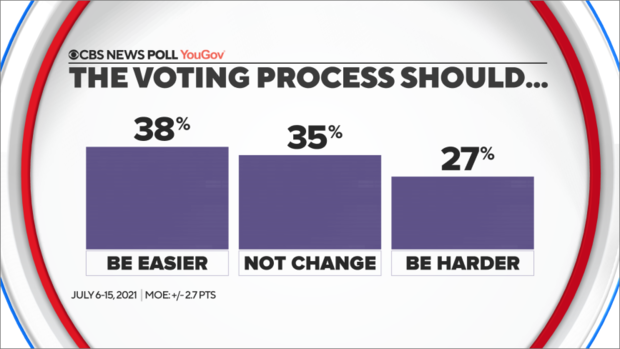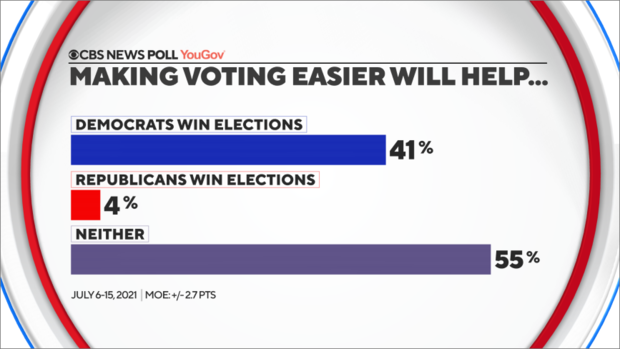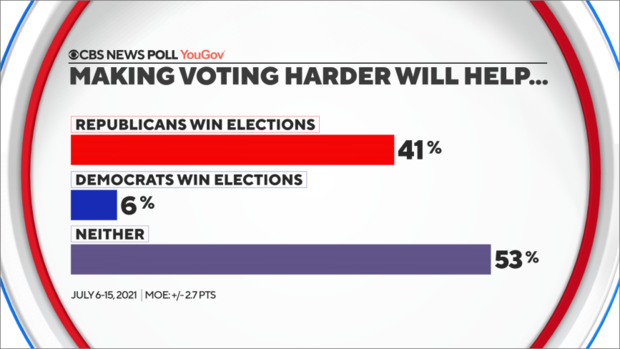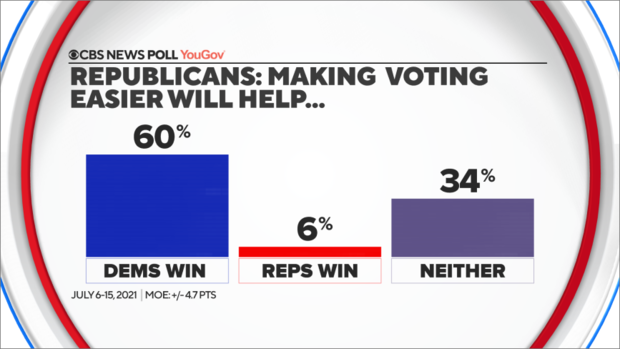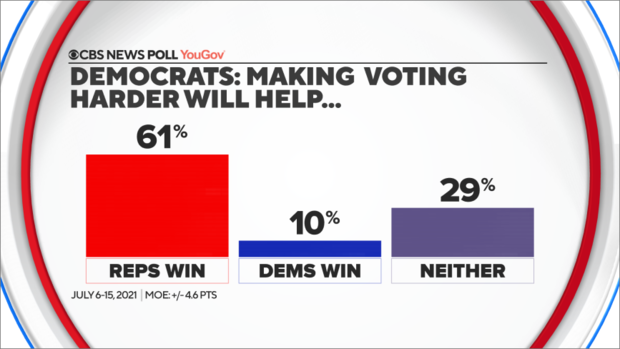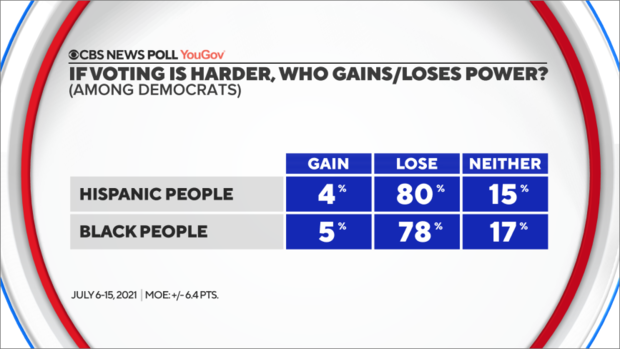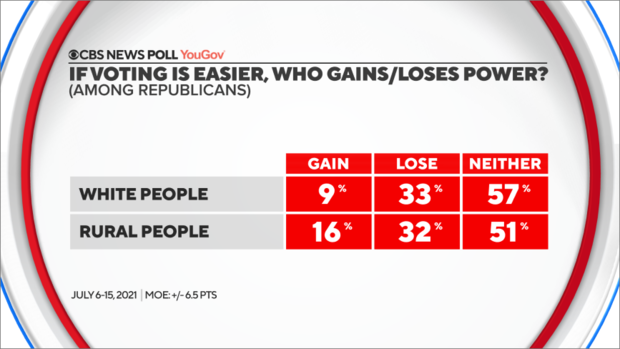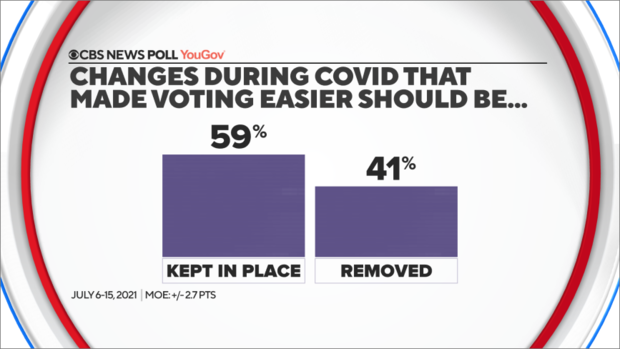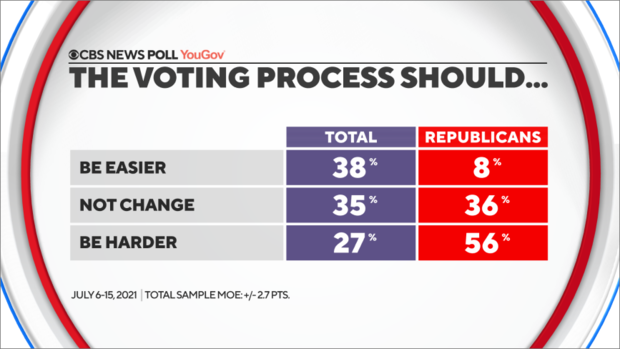Most Americans don't want voting to be harder; Democrats and GOP see political fortunes at stake - CBS News study
As a host of states try to change their voting rules, most Americans say they'd prefer the voting process to be left alone — or made easier. Relatively few want it to be harder after an election that saw record turnout.
With the fight over voting attracting national attention, partisans say it's a high-stakes battle that affects their electoral fortunes. Republicans think Democrats will do better in elections if voting becomes easier. At the same time, Democrats think they'll suffer if it becomes harder to vote, and they believe many of their constituent groups, including Hispanic and Black Americans, would lose political power.
Voting rules: Who wins and who loses?
Many — more than 4 in 10 — foresee an impact on election outcomes if rules are changed. Among those who expect an impact, by 10 to 1, more think if voting rules are made easier for people to vote that would do more to help Democrats win elections than Republicans. And by a similar margin, they feel if voting rules make it harder to vote, that would benefit Republican candidates more than Democratic candidates.
If voting is made harder, Democrats see risk to their election fortunes, and if it's made easier, Republicans see risk to theirs.
Who will gain or lose political power?
Beyond winning or losing elections, different groups of voters may stand to gain or lose power depending on voting rules.
Democrats think easier voting access would benefit some of their constituent voter groups, and even more, that making voting harder would result in these groups losing power. They feel that when states make it easier to vote, Black people, Hispanic people, poor people, younger people, and those in urban areas are more likely to gain power than lose power. Conversely, when states make it harder to vote, Black people, Hispanic people, and poor people are seen as losing power by at least 8 in 10, while large majorities see rich people (86%) and White people (71%) as gaining power.
Republicans are less likely than Democrats to see gains and losses for specific voter groups. But on balance, they feel White people, older people, and those in rural areas — groups who tend to vote Republican — lose power, rather than gain it, when states make it easier to vote; and that younger people, Black people, Hispanic people, and those in urban areas gain power more than lose it.
Voting: What do people want from the process?
Eight in 10 of those who cast ballots in 2020 said the process was "very easy", and most of them, as well as the public at large, want the voting process to be left as is or made easier, not harder. And most would not make their own state's process easier or harder — 6 in 10 say it's about right.
These views extend to support for keeping some of the measures put in place in 2020 that made it more convenient to cast a ballot amid the COVID-19 pandemic. Six in 10 Americans want these changes to remain in place for future elections. This is particularly the case for those who made the switch from in person to mail voting in 2020, even though most said they chose mail voting due to concern about the coronavirus.
Republicans stand apart from the public in their views. More than half think the voting process in general should be made harder, especially Trump voters and those who falsely believe the 2020 election was marred by fraud and irregularities. Most Republicans would also roll back the rules changes put in place during the pandemic.
Partisans' views echo political discourse, in which easier voting is assumed to boost turnout and therefore advantage Democrats, but they may not be right. While many states expanded by-mail voting in 2020, for example, it's unclear how responsible that was for last year's historic turnout. Sky-high interest in the election may have been just as important, with rules changes affecting how people cast ballots more than who actually votes.
For example, a recent historical study of elections since 1996 finds that universal vote-by-mail — when eligible voters are sent ballots before the election — has resulted in minor turnout gains without advantaging one party. In Texas, allowing people to vote by mail during the pandemic resulted in many voters choosing to substitute a mail ballot for in-person voting, but neither party's vote share nor overall turnout increased in the state as a result of this policy.
Moreover, even if an easier voting system boosted turnout, recent electoral history casts doubt on the idea that Democrats would necessarily benefit. Across U.S. counties and states, there is a weak relationship between turnout increases and Democratic gains in 2020 (see chart below). Another reason for pause is that people who turned out in 2020 but not 2016 — including new and returning voters — voted Republican at higher rates than many expected, helping deliver key states like Florida and Ohio to Donald Trump.
This is the first in a series of reports from a new CBS News study on America's elections and voting process. The study is based on several data sources: a national survey, voter file data, and certified election results. The survey includes an oversample of over 2,000 validated voters who were matched to voter files confirming their vote history. We also reference academic work and data journalism by other researchers on voting rights and election administration.
The survey was conducted by YouGov using a nationally representative sample of 2,664 U.S. residents interviewed between July 6-15, 2021. Of the 2,065 self-reported voters in the sample, 2,023 were matched to voter files and confirmed as having voted. The sample was weighted according to gender, age, race and education based on the American Community Survey, conducted by the U.S. Bureau of the Census, as well as the 2020 presidential vote and registration status. The margin of error is ±2.7 points for the total sample.


